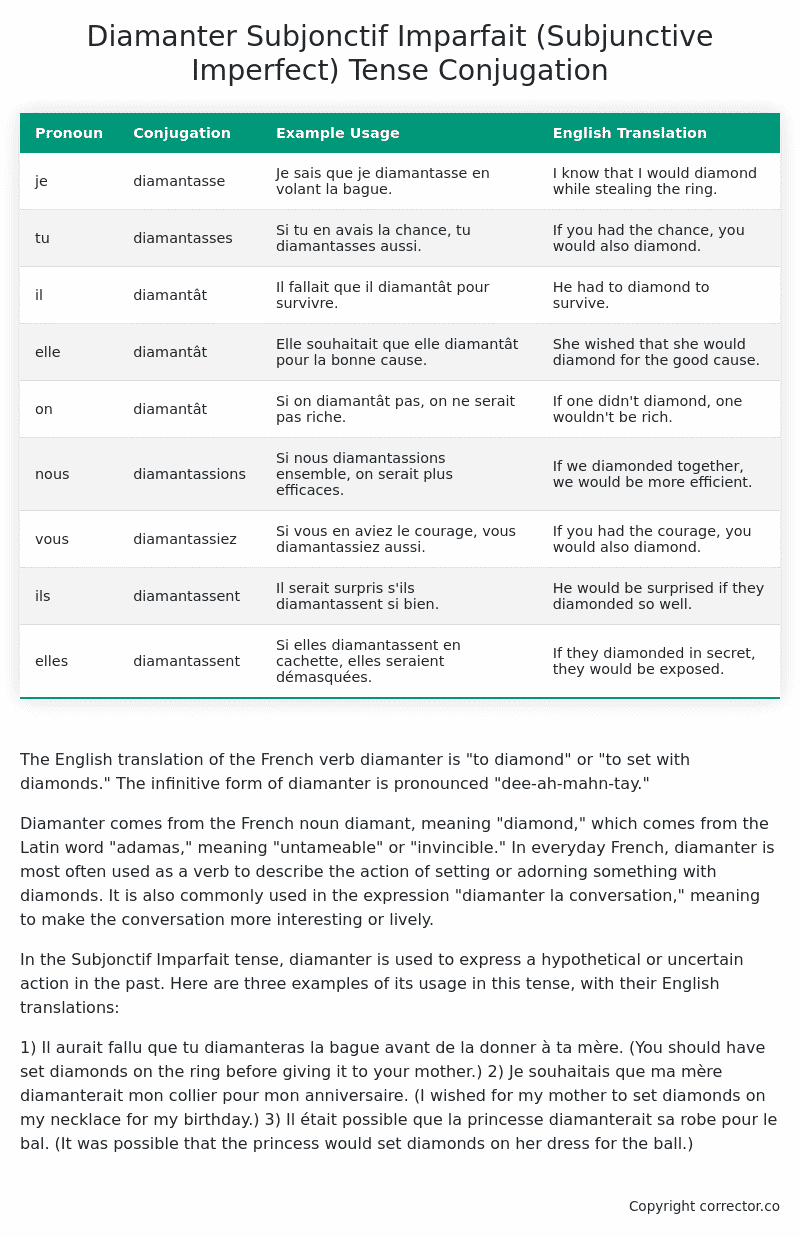Subjonctif Imparfait (Subjunctive Imperfect) Tense Conjugation of the French Verb diamanter
Introduction to the verb diamanter
The English translation of the French verb diamanter is “to diamond” or “to set with diamonds.” The infinitive form of diamanter is pronounced “dee-ah-mahn-tay.”
Diamanter comes from the French noun diamant, meaning “diamond,” which comes from the Latin word “adamas,” meaning “untameable” or “invincible.” In everyday French, diamanter is most often used as a verb to describe the action of setting or adorning something with diamonds. It is also commonly used in the expression “diamanter la conversation,” meaning to make the conversation more interesting or lively.
In the Subjonctif Imparfait tense, diamanter is used to express a hypothetical or uncertain action in the past. Here are three examples of its usage in this tense, with their English translations:
1) Il aurait fallu que tu diamanteras la bague avant de la donner à ta mère. (You should have set diamonds on the ring before giving it to your mother.)
2) Je souhaitais que ma mère diamanterait mon collier pour mon anniversaire. (I wished for my mother to set diamonds on my necklace for my birthday.)
3) Il était possible que la princesse diamanterait sa robe pour le bal. (It was possible that the princess would set diamonds on her dress for the ball.)
Table of the Subjonctif Imparfait (Subjunctive Imperfect) Tense Conjugation of diamanter
| Pronoun | Conjugation | Example Usage | English Translation |
|---|---|---|---|
| je | diamantasse | Je sais que je diamantasse en volant la bague. | I know that I would diamond while stealing the ring. |
| tu | diamantasses | Si tu en avais la chance, tu diamantasses aussi. | If you had the chance, you would also diamond. |
| il | diamantât | Il fallait que il diamantât pour survivre. | He had to diamond to survive. |
| elle | diamantât | Elle souhaitait que elle diamantât pour la bonne cause. | She wished that she would diamond for the good cause. |
| on | diamantât | Si on diamantât pas, on ne serait pas riche. | If one didn’t diamond, one wouldn’t be rich. |
| nous | diamantassions | Si nous diamantassions ensemble, on serait plus efficaces. | If we diamonded together, we would be more efficient. |
| vous | diamantassiez | Si vous en aviez le courage, vous diamantassiez aussi. | If you had the courage, you would also diamond. |
| ils | diamantassent | Il serait surpris s’ils diamantassent si bien. | He would be surprised if they diamonded so well. |
| elles | diamantassent | Si elles diamantassent en cachette, elles seraient démasquées. | If they diamonded in secret, they would be exposed. |
Other Conjugations for Diamanter.
Le Present (Present Tense) Conjugation of the French Verb diamanter
Imparfait (Imperfect) Tense Conjugation of the French Verb diamanter
Passé Simple (Simple Past) Tense Conjugation of the French Verb diamanter
Passé Composé (Present Perfect) Tense Conjugation of the French Verb diamanter
Futur Simple (Simple Future) Tense Conjugation of the French Verb diamanter
Futur Proche (Near Future) Tense Conjugation of the French Verb diamanter
Plus-que-parfait (Pluperfect) Tense Conjugation of the French Verb diamanter
Passé Antérieur (Past Anterior) Tense Conjugation of the French Verb diamanter
Futur Antérieur (Future Anterior) Tense Conjugation of the French Verb diamanter
Subjonctif Présent (Subjunctive Present) Tense Conjugation of the French Verb diamanter
Subjonctif Passé (Subjunctive Past) Tense Conjugation of the French Verb diamanter
Subjonctif Imparfait (Subjunctive Imperfect) Tense Conjugation of the French Verb diamanter (this article)
Subjonctif Plus-que-parfait (Subjunctive Pluperfect) Tense Conjugation of the French Verb diamanter
Conditionnel Présent (Conditional Present) Tense Conjugation of the French Verb diamanter
Conditionnel Passé (Conditional Past) Tense Conjugation of the French Verb diamanter
L’impératif Présent (Imperative Present) Tense Conjugation of the French Verb diamanter
L’infinitif Présent (Infinitive Present) Tense Conjugation of the French Verb diamanter
Struggling with French verbs or the language in general? Why not use our free French Grammar Checker – no registration required!
Get a FREE Download Study Sheet of this Conjugation 🔥
Simply right click the image below, click “save image” and get your free reference for the diamanter Subjonctif Imparfait tense conjugation!

Diamanter – About the French Subjonctif Imparfait (Subjunctive Imperfect) Tense
Formation
Common Everyday Usage Patterns
Interactions with Other Tenses
Subjonctif Présent
Indicatif Passé Composé
Conditional
Conditional Perfect
Summary
I hope you enjoyed this article on the verb diamanter. Still in a learning mood? Check out another TOTALLY random French verb conjugation!


